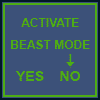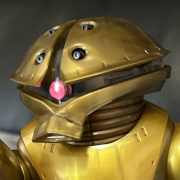|
The weirdness sets in when you have modifiers to both target numbers and dice pools. It is in no way intuitive or obvious whether 6 dice at 8 is better or worse than 5 dice at 7.
Terrorforge fucked around with this message at 02:20 on May 25, 2016 |
|
|
|

|
| # ? May 23, 2024 10:43 |
|
Covok posted:Mathematically, what's wrong with oWoD having the difficulty set the TN for a success on a die? I heard some people say it makes the math wonky, but, to me, it seems like the rule "more dice = better" remains true, ignoring the "botch cancels success" rule mucking things up. By having two variables (number of dice, impact of each dice toward success) contribute to a weighted coin-flip towards a singular outcome, you over-complicate the system into a wild and woolly 9x10 or more matrix of possibilities. This is doubly true when those two variables are sides to a false dichotomy where one is about "something isn't as difficult to you" and the other is "you are better at doing things that could be difficult". Declaring what bonus should be where isn't exactly an easy state, especially when you're mixing the sort of actions they apply to. This is triply true when you have players and even game designers themselves unable to accurately derive the worth of the bonus into resource allocation- be it in combat turns, character-build units, or social game-play.
|
|
|
|
In general, you want players to be able to quickly and accurately estimate the odds of success on a roll on their own after some experience with the system. oWoD's possibility matrix means that literal statisticians have trouble doing this beyond very simple pools, and the average player is just flat out working off hunches without a probability calculating app. Note: this also means that properly designing mechanics is a bitch and a half, because if you can't estimate the rough power of a TN adjustment easily, there are going to end up being some TN adjustments mistakenly valued higher or lower than others. e: well that shows me for not refreshing the window before posting
|
|
|
|
Having TN changes and dicepool changes in the same system is fine if they represent unambiguously different things such that a player or storyteller never has to choose between them. Like, if nWoD had been written from the beginning to contain TN changes and dicepool changes, and TN changes always came from supernatural powers, and dicepool changes always came from mundane circumstances or equipment, I think it'd have worked perfectly swell.
|
|
|
|
Also, high target numbers can actually, at the top end, make you more likely to botch the more dice you have. In addition- the ability to reduce target numbers just gives a powerful min-max angle unless tightly restricted. I'm reminded of the late oWoD powers of the Hsien and their ability to do things like throw 12-14 unavoidable (possibly aggravated) levels of damage down trivially.
|
|
|
|
If I'm reading the Mage2e writeup in F&F correctly: Making yourself bulletproof is easiest by combining Space3 and Matter2 in order to put a Ban on bullets? bewilderment fucked around with this message at 04:19 on May 25, 2016 |
|
|
|
All of this stat chat is bringing back some terrible god drat memories of chats and people with absurd dice pools all arguing that everything should be standard or lower difficulty for reasons. I guess it's success creep - where a success isn't a success unless you get four or more to go along with them.
|
|
|
|
Alien Rope Burn posted:Also, high target numbers can actually, at the top end, make you more likely to botch the more dice you have. In addition- the ability to reduce target numbers just gives a powerful min-max angle unless tightly restricted. I'm reminded of the late oWoD powers of the Hsien and their ability to do things like throw 12-14 unavoidable (possibly aggravated) levels of damage down trivially. If your Difficulty is 10, then your chance of botching goes up to 50% asymptotically because you're effectively making coin flips on a lousy table and checking whether you have more heads or tails that haven't fallen off that table. With enough coin flips, the chance of having the same number of heads as tails goes to zero. But the issue is that you're recommended in most cases to not use Difficulty 10 in the first place, but instead to use Difficulty 9 with a built-in nega-success. If your Difficulty is 9, then your chance of botching peaks at ~19% with six dice before going back down. But in such a case you're likely best off spending a point of WP beforehand to reduce your chances of botching to at most ~7%, especially since buying up WP is relatively cheap for OWoD characters. Difficulties of 8, 7, and 6 do peak their botch chances at 3/2/2 dice respectively; though in such cases your botch chance will still drop off rapidly with more dice. Difficulties of 3 and 2 will occasionally increase your chances of botching (slightly) when adding more dice, but only because so few states count as a neutral value of zero successes rather than 1 or -1. And even then, your botch chances still go asymptotically down in the long term when adding dice. So the long and short of it is that the only two Difficulties for which adding more dice meaningfully increases your chance to botch are either -an edge case that the books suggest you not use in the first place if possible, or -a situation that's relatively easy to mitigate (but not necessarily come out ahead on). (The tests I ran use this code from AnyDice, and there are also some tools in there to simulate OWoD specializations or NWoD's probabilities.) citybeatnik posted:All of this stat chat is bringing back some terrible god drat memories of chats and people with absurd dice pools all arguing that everything should be standard or lower difficulty for reasons. I guess it's success creep - where a success isn't a success unless you get four or more to go along with them.
|
|
|
|
NGDBSS posted:In practice, only having 9 or 10 as Difficulties actually will make a difference on increasing your chance of botching. I don't think that contradicts anything I wrote, but thanks for the clarification.
|
|
|
|
I prettified the CofD merit calculator app (for lack of a better name/descriptor) I've been working on. It's serving as my learning experience with MDL. I still need to implement functionality for merits that have other merits as a prerequisite (which is why the switches in the Merit section don't work). Once that's done, I can expand it to splats other than Mortal. The links to other splats don't actually do anything, yet. Kibner fucked around with this message at 23:54 on May 25, 2016 |
|
|
|
Am I complete idiot or is intentionally taking a dramatic failure on some of the Demon embeds and exploits a really good idea? Cause especially the fire one that automatically makes it combust actually seems better than the success like half the time. What am I missing? (But finally reading through the book for the first time Holy loving poo poo does this own so hard. My only worry is I know my group and they're really, really gonna wanna Go Loud as often as possible, which is gonna be a weird balance of making sure they know it's bad but giving them some chances to do it because ffffffuuuuuuck that is so cool.)
|
|
|
|
Xiahou Dun posted:Am I complete idiot or is intentionally taking a dramatic failure on some of the Demon embeds and exploits a really good idea? Having not actually read the power in question, it may be an attempt at emulating the oDemon Torment-system where you could always, voluntarily, use the 'Evil' version of your power. Though in oDemon you didn't get XP, you just became more damned every time you did it.
|
|
|
|
Xiahou Dun posted:Cause especially the fire one that automatically makes it combust actually seems better than the success like half the time. What am I missing? The part where success and dramatic failure operate on different timescales and often have meaningfully different effects. For Combustion, Success means priming the object to explode - meaning you'll often be using the Embed some time before you actually want it to explode. Yes the dramatic failure is an upgrade if you were trying to blow up that guy's car as soon as possible, but if you meant to turn it into a literal car bomb and wait for him to turn the ignition, ya dun goofed. It'd be really useful if you could choose to fail on purpose, though, as would the dramatic failure effect of many other demon powers. The same is also true of exceptional successes, oddly enough. An exceptional success on Shatter, for example, does sort of the reverse of a dramatic failure on Combusition; a Success breaks an object instantly, but an Exceptional success lets you destroy it anytime in the next minute. You'll note that 9/10 times being allowed to delay the destruction of something you were planning to smash now isn't much of an upgrade.
|
|
|
|
Xiahou Dun posted:Am I complete idiot or is intentionally taking a dramatic failure on some of the Demon embeds and exploits a really good idea? The dev comment on this question basically boiled down to "if the dramatic failure effect would actually be helpful then the Storyteller should improvise something else, but finding a dramatic failure effect potentially useful is a great justification for inventing a new Embed or Exploit to accomplish just that by reversing the principles you've already mastered." I think going loud should work out in play easier than you think. Remember, a demon can only maintain a number of full Covers at once equal to their Primum. The Cipher will allow demons to climb their first dot or two pretty quickly compared to other monster splats, but that's still an entire human soul or a few patched-together relationships for each go, with only one or two you can keep in reserve at a time if you want to still have a Cover to return to after you're done going loud.
|
|
|
|
I Am Just a Box posted:I think going loud should work out in play easier than you think. Remember, a demon can only maintain a number of full Covers at once equal to their Primum. The Cipher will allow demons to climb their first dot or two pretty quickly compared to other monster splats, but that's still an entire human soul or a few patched-together relationships for each go, with only one or two you can keep in reserve at a time if you want to still have a Cover to return to after you're done going loud. Also remember that since Soul Pacts cost a dot of Willpower, in most cases Going Loud effectively burns an experience point along with all the other costs.
|
|
|
|
I Am Just a Box posted:The dev comment on this question basically boiled down to "if the dramatic failure effect would actually be helpful then the Storyteller should improvise something else, but finding a dramatic failure effect potentially useful is a great justification for inventing a new Embed or Exploit to accomplish just that by reversing the principles you've already mastered." The problem with that is that under the CoD rules, you can get experience for turning failures into dramatic failures. So a useful effect resulting from a dramatic failure is actually better than the same effect resulting from a successful roll. Also, saying that the Storyteller should fix something using Rule 0 is pretty much admitting that the original rule is broken.
|
|
|
|
If your players are truly gaming the rules then you might as well just go by the book but add a compromise roll that starts bad and gets worse the more it comes up. A demon loving up spectacularly should always make a lot of noise.
|
|
|
|
Terrorforge posted:Also remember that since Soul Pacts cost a dot of Willpower, in most cases Going Loud effectively burns an experience point along with all the other costs. If you're actually using beats then that isn't so bad since you can just go deliberately farm them.If you aren't then it's a bit more problematic.
|
|
|
|
Terrorforge posted:The weirdness sets in when you have modifiers to both target numbers and dice pools. It is in no way intuitive or obvious whether 6 dice at 8 is better or worse than 5 dice at 7. Okay, I have to ask: Is there anyone in this thread who cannot figure out the answer to this in their head?
|
|
|
|
MalcolmSheppard posted:Okay, I have to ask: Is there anyone in this thread who cannot figure out the answer to this in their head? *slowly raises hand* I mean, I know that for a single die, TN8 gets me a 33.333..% chance of success, and intuitively I assume that turning that to TN7 increases that to 43.333...%. But I don't instinctively know my chances of a single success for either pool, let alone if I want multiple successes for whatever reason.
|
|
|
|
MalcolmSheppard posted:Okay, I have to ask: Is there anyone in this thread who cannot figure out the answer to this in their head? I know very little about calculating probabilities, so I could come up with a guess but it's as like as not based on intuitive guessing, which probability is notoriously difficult for.
|
|
|
|
MalcolmSheppard posted:Okay, I have to ask: Is there anyone in this thread who cannot figure out the answer to this in their head? Yeah, this is not intuitive at all.
|
|
|
|
Rolling 6 dice is better, because I have more fun when I roll bigger dice pools. hth
|
|
|
|
MalcolmSheppard posted:Okay, I have to ask: Is there anyone in this thread who cannot figure out the answer to this in their head? Instinctively, I want to say that the odds of rolling a single success are equal to the inverse of the odds of rolling all failures. So, ignoring exploding dice, that would be 1 - [(success threshold - 1) / 10] ^ (number of dice). Can I calculate 1 - [(8-1)/10]^7 vs 1 - [(7-1)/10]^6 in my head? No. I don't even know how to approximate it. I'd need a table beside me at all times to look it up quickly. If I need more than one success, that's another equation, which is another table, and so on. I like changing TNs, and I like changing die pools, but never both at once.
|
|
|
|
MalcolmSheppard posted:Okay, I have to ask: Is there anyone in this thread who cannot figure out the answer to this in their head? On the fly in a game? Absolutely not. I could manage an uncertain guess that 5 dice at target 7 is probably more successful, but damned if I could tell you how many dice a target shift from 8 to 7 is equivalent to off the top of my head, or at what dice pool sizes the shift begins to devalue or appreciate. And this is after playing in a years-long Exalted game with characters who regularly used target-shifting powers. It still doesn't soak in or become familiar. I bet if I sat down and took the time to work it out I could figure it, but not fast enough to avoid seriously disrupting a game.
|
|
|
|
I can make rough napkin guesses but I don't know if I'd trust them without doing the actual math.
|
|
|
|
Also, is it really critical to have the ability to shift both? If it makes the math more complicated, even if it could be done, is there some critical gameplay element that absolutely demands having both TN and dicepool shift? Like, that question should be asked even before 'is the math feasible to do quickly'.
|
|
|
|
Night10194 posted:Also, is it really critical to have the ability to shift both? If it makes the math more complicated, even if it could be done, is there some critical gameplay element that absolutely demands having both TN and dicepool shift? Like, that question should be asked even before 'is the math feasible to do quickly'. Is it critical? No, Was it an amazing thing when you had exploding dice, a TN of 4, and a dice pool of 8? Yes. I miss my Glass Walker Ahroun Hacker.
|
|
|
|
MalcolmSheppard posted:Okay, I have to ask: Is there anyone in this thread who cannot figure out the answer to this in their head? Literally studied statistics for a bit in college and I can generally figure this out pretty easily if and only if I'm figuring how many successes on average I get, NOT what my chances are of getting at least one success. To get your odds of just one success: you've got a 3/10 chance of success, go for the inverse like blastron said. You got a 7/10 chance to fail (.7^x) so the probability of getting at least one success is 1-.7^x. I never memorized my times tables, and I'm loving terrible at multiplying sevens, so that would absolutely require a calculator to figure out if I'm rolling more then, like, two dice. To calculate with the 7's, it's 1-.6^x, and guess what, I ain't that much better at exponentially multiplying sixes. So no, can't do that one in my head. It is, in fact, actually way easier to get your "vaguely on average how many successes do I get," if a lot more loosey goosey and a lot more "technically accurate." You get one success for every three dice if its 8+, one success for every two and a half die (with a bit of wiggle room; with 8+ you've got a nice even x/3, with 7+ it's 4x/9, and gently caress that, so we just go "OK 4/10 WITH SOME WIGGLE ROOM GOT IT) if it's 7+, so, on average, those two dice pools will give you the same results of 2 successes, though the 7+ has more weight behind it. So yeah, I can do that one in my head, but it's not going to be nearly as accurate as the first one. EDIT: It gets way more loving complicated once you change it to reroll 9's or 8's, incidentally. 10's a nice, easy number to work with. 8? gently caress 8. ProfessorCirno fucked around with this message at 06:59 on May 26, 2016 |
|
|
|
It's okay if a system has both 6 dice t8 and 5 dice t7 in it but it's stupid for that system to ask a player to choose which one is likely to generate more successes (or to ask the storyteller to choose which one to use to represent the difficulty of a task) because there's a mathematically straightforward answer such that one of the two turns out to be a newbie trap.
|
|
|
|
Part of the oWoD problem is that it gives you too many levers to fine-tune difficulty. You've got the constructed pool, which you can in theory monkey around with by adding or removing dice. You've got the orbiting TN which can move up or down for good/bad things. You've got things like ghost failures and botches and ghost successes that can gobble your successes. You've got some kind of intrinsic difficulty, so you need X successes before you can even tell if you actually did what you wanted to do. This is all assuming you aren't in combat, in which case you still need to roll VS dodge to see if you hit, then roll VS soak to see if your hit mattered. It is not intuitive and is a very legacy mechanic. There is absolutely no reason to use sliding TNs when adjusting dice pools would do, or vice versa. Yes, they have different outcomes in terms of probability; no, I don't actually care about the fine tuning of probability in actual play, to say nothing of the fact that I absolutely cannot calculate it on the fly. It was a good game, but the system has a lot of cruft left over from when the designers were experimenting with poo poo that wasn't "roll a d20."
|
|
|
|
MalcolmSheppard posted:Okay, I have to ask: Is there anyone in this thread who cannot figure out the answer to this in their head? I don't do numbers good, so yes, some of us can't work out statistical probabilities in their heads with ease. Not everyone who plays Nerdgames is good with numbers, statistics, or probability once it gets more complex than one or two dice in play. In fact, I would go so far as to the say the majority of the base for nerdgames can't do it without a pen and paper and a few minutes. If you add the other rules, like botch dice and additional successes, and then add a contesting dice roll, the number who can will decrease even further.
|
|
|
|
ProfessorCirno posted:Literally studied statistics for a bit in college and I can generally figure this out pretty easily if and only if I'm figuring how many successes on average I get, NOT what my chances are of getting at least one success. To get your odds of just one success: you've got a 3/10 chance of success, go for the inverse like blastron said. You got a 7/10 chance to fail (.7^x) so the probability of getting at least one success is 1-.7^x. I never memorized my times tables, and I'm loving terrible at multiplying sevens, so that would absolutely require a calculator to figure out if I'm rolling more then, like, two dice. To calculate with the 7's, it's 1-.6^x, and guess what, I ain't that much better at exponentially multiplying sixes. So no, can't do that one in my head. A fun trick I realized is that if the TN is 7, 0.7^2 is 0.49 ~= 0.5, which means probabilities for even numbers of dice, having the progression 0.5, 0.75, 0.875, 0.9375 for 2, 4, 6, 8 dice - or even simpler, the probability of failure is a half, a fourth, an eigth, one sixteenth... (0.5, 0.25, 0.125, 0.0625, ...)
|
|
|
|
Dr of Computational Chemistry here, and sure, I can make a good guess on the fly for which dice pool and TN combo is better, but do I want to.... should I? Should I expect that of my players? Now the system used is not as bad as say Cthulhu Tech, but as people pointed out it is far easier to judge and create challenges based on a degree of success based on a fixed TN. More dice is better (and thank christ CofD got rid of 1s cancelling because that opened up a problem for larger pools). Having TNs and pools both varying begs the question "what value is there in both varying to change the chance of success?" Less moving parts is better and allows for a better game in my opinion. RPGs, especially CofD is not simulationist. This is why I prefer Warmachine (roll to hit, roll to wound) vs Warhammer (roll to hit, roll to wound, roll to save), and pools (nice distributions) vs single die rolls.
dr_ether fucked around with this message at 10:38 on May 26, 2016 |
|
|
|
Mendrian posted:Part of the oWoD problem is that it gives you too many levers to fine-tune difficulty. There's a lot of folk recollection at work. Leaving aside the fact that 1s don't subtract successes anymore (and didn't from Revised onward), the basic system has always been that difficulty was a measure of . . . difficulty. Successes were degrees of success. CWoD games generally avoided modifying the dice pool itself, though with such a huge volume of material you'll see exceptions. The one major exception was multiple actions, where splitting the pool promoted ease of play in the face of rolls that might already have difficulty modifiers. I freely admit there are some exceptions I don't care for, such as Mage: The Ascension's use of successes to act as Effect benchmarks, driven by a variable difficulty pool, but the split between ease and output was baked in. Conversely, Mummy's TN-shifting powers are pretty strictly circumscribed. They usually don't provide more than a 2 point shift, are firmly limited to a TN 6-10 range, and usually don't stack. MalcolmSheppard fucked around with this message at 11:45 on May 26, 2016 |
|
|
|
MalcolmSheppard posted:There's a lot of folk recollection at work. Leaving aside the fact that 1s don't subtract successes anymore (and didn't from Revised onward), the basic system has always been that difficulty was a measure of . . . difficulty. Successes were degrees of success. CWoD games generally avoided modifying the dice pool itself, though with such a huge volume of material you'll see exceptions. The one major exception was multiple actions, where splitting the pool promoted ease of play in the face of rolls that might already have difficulty modifiers. I freely admit there are some exceptions I don't care for, such as Mage: The Ascension's use of successes to act as Effect benchmarks, driven by a variable difficulty pool, but the split between ease and output was baked in. "Whenever one of the dice comes up as a "1", it cancels out a success. Completely. Take the dice showing "1" and one of the dice showing a successful number and set them aside. In this manner, an otherwise successful action may be reduced to failure." Vampire: the Masquerade, (Revised Edition) p. 192. Sure, difficulty was a measure of difficulty. And successes were degrees of success, with 1 success being a "marginal success" that in some cases was basically a failure so you really needed 2 or 3 successes.. And 1 success being enough to succeed isn't even given; on page 191 it says "You need only one success to perform most actions successfully, but that's considered a marginal success." (Emphasis mine.) Besides, the interactions of dice-pool and difficulty are always the hardest when you're given a choice to alter one or the other, because that's when you want to determine which is best. For example, if you through some means can split your action to reduce the difficulty on the roll you want to make, is splitting the action actually worth it, or will you end up loving yourself over to no advantage? With Vampires it's even easier to run into this issue because they can spend Blood Points to increase their physical pools, which means you have to evaluate the value of that too. Or, for basically any CWoD game, say you can imagine two possible ways to solve a problem, and one is X+Y dice against difficulty Z and you need to score 1 success but the other approach is W+V dice against difficulty U, but then you need 3 successes to accomplish what you really want but the difficulty of the first action would be reduced if you could turn on your flashlight so you consider splitting your action to make a light but you could also use this multiple action power to not get the dice penalty but you're not sure if simply using your dice-adding power would be cheaper in the long run and... (Also, you have no idea what you're talking about because I have also read Mage: the Ascension 20th Anniversary Edition, and it is full on Difficulty and Threshold Successes being just two ways to describe difficulty while 1's subtract successes and very liberal use of minimum Threshold Successes. That's not just for spell effects either; completely regular actions are X+Y dice against difficulty Z for more than W successes to actually succeed.)
|
|
|
|
LatwPIAT posted:A fun trick I realized is that if the TN is 7, 0.7^2 is 0.49 ~= 0.5, which means probabilities for even numbers of dice, having the progression 0.5, 0.75, 0.875, 0.9375 for 2, 4, 6, 8 dice - or even simpler, the probability of failure is a half, a fourth, an eigth, one sixteenth... (0.5, 0.25, 0.125, 0.0625, ...) Oh hey, that's a really useful way of thinking about it. I actually put together a gdrive sheet a while back because I was curious about how this looks, but I never noticed this pattern. If anyone is curious to see the actual numbers: https://docs.google.com/spreadsheets/d/1ibxknTTINCr9eG4wxgBoLIdUzBuzqRD7w2NcUHSa_rI/edit?usp=sharing Summary for people who don't get numbers and/or didn't know already: nWoD/CofD (and presumably oWoD but with the aforementioned convoluted math I don't want to make assumptions) has a huge diminishing return thing going. 4 dice gives a 75% success rate, but adding another 4 (making the total 8) only bumps it up to 95%. If you go even higher than that, the value of each additional die quickly drops below 1%. In other words, the difference between a journeyman and a master isn't as in many other systems that the master is substantially more likely to succeed at a routine task, but rather that she's likely to produce better results more quickly (more successes) and be able to tackle substantially more difficult problems (accept higher penalties) without buckling. It also means that sinking points into something you're bad at is generally more valuable than getting your 9th dot somewhere unless you're expecting to negate some big penalties. Brawl and Weaponry for example will nearly always be operating under at least a -2 modifier so the 5th and 6th dice in those pools will tend to be more valuable than the equivalent in, say, Science.
|
|
|
|
MalcolmSheppard posted:There's a lot of folk recollection at work. Leaving aside the fact that 1s don't subtract successes anymore (and didn't from Revised onward) They do in V20, M20 and Orpheus, the 3 oWoD games I have actually read and/or played, all of which post-date Revised. In the end in the V20 game I was in, we stopped using 1s subtract from successes when we heard the devs houseruled that out in their games. V20's the only book I have to hand, but page 250 under "botches": V20, page 250 posted:Bad luck can ruin anything. One more basic of a roll is a “botch.” Whenever one of the dice comes up as a 1, it cancels out a success. Completely. Take the die showing 1 and one of the dice showing a success and set them aside. In this manner, an otherwise successful action may be reduced to failure. This is the thing, dude. You write (wrote?) for White Wolf and even you think that this rule was phased out - because it sucks. It sucks hard. Nobody likes this loving rule and it keeps showing up - presumably because people keeping copy-pasting from old books without proofreading.
|
|
|
|
And page 235 of W20 and DAV20 322 as well. It's in literally every 20th anniversary edition, so I really don't know where the claim it isn't in use anymore is coming from.
|
|
|
|

|
| # ? May 23, 2024 10:43 |
|
Also you seem to be under the impression that people can do complex probability in our heads.
|
|
|



































